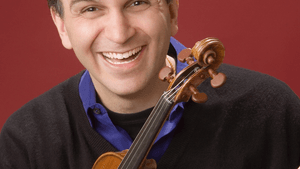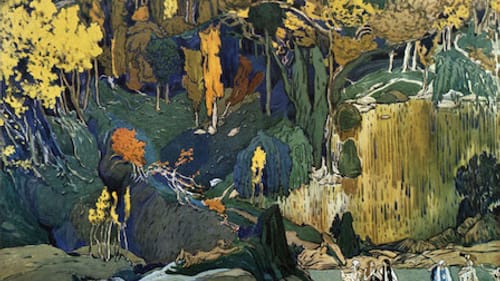Stay in the Loop
BSR publishes on a weekly schedule, with an email newsletter every Wednesday and Thursday morning. There’s no paywall, and subscribing is always free.
The ecstasy of sound
Philadelphia Orchestra presents Denève and Shaham

The headline on a cosmetics brochure caught my eye as I left the Kimmel Center after the Philadelphia Orchestra’s concert featuring violinist Gil Shaham. It shouted, “Flawless!” I couldn’t have said it better myself.
Violinist Shaham performed the first movement of Tchaikovsky’s Violin Concerto — familiar but never stale — with joy, gusto, and nuance, with conductor Stéphane Denève, and the orchestra. The entire performance was a revelation, but its first movement was so perfectly realized that savvy concertgoers (myself included) broke a rule of musical etiquette at the Friday matinee by roaring approval before the second movement began.
I enjoyed the second and third movements fully, but not to the degree of the first, and wonder whether the break in continuity caused by our heartfelt applause influenced the performance or if this was simply my own perception. Were the performers thinking, “How can we top that?” The first movement flickered with moods and feelings, depths and bursts of virtuosity, and subtle variations in volume I don’t think I ever observed in this work before, setting a high standard that was almost impossible to match.
The slow movement was interpreted with a beguiling gentleness, almost a shyness, that was sometimes too reserved for my taste. The final movement was fresh and spirited, with virtuosity and impeccable instinct for drama by Shaham, whose faced glowed with anticipation and eager pleasure throughout.
"Ice, cocaine, and rainbows"
Sharing fully in the moment’s perfection, Denève allowed Shaham’s Stradivarius to soar elegantly above the orchestra, balancing the powerful symphonic forces against the violin’s shimmering high notes and seductive low tones. It was music-making at its most magical. Shaham responded to a standing ovation and several curtain calls by playing Bach’s "Loure" and "Gigue" from the unaccompanied Partita No. 3 in E major.
The entire program shared in this magic, but Alexander Scriabin’s The Poem of Ecstasy lived up to its name. In opening remarks, Denève joked that the program might be rated NC-17, as evidenced by the second half of the program’s voluptuous Poem and Debussy’s languid Prelude to the Afternoon of a Faun.
Everything about the Poem is evocative and lushly romantic, as though the soughing string section was turned into a churning ocean of sound punctuated by the brilliant trumpet’s theme over and again until the end. Henry Miller called it “a bath of ice, cocaine, and rainbows.” There is no resisting: you will drown, musically, in this sound.

Scriabin, a mystical Russian composer who died two years before the revolution, was inspired to write this work by his own literary efforts, originally titled Orgiastic Poem. It’s filled with references to bliss, heaven, dreams, spirit, and surrender, ideas that cross over into his musical impressions. Denève frothed the orchestra to a mad pitch of ecstasy, yet somehow, like gravity, maintained a strong core of control that kept everything from sliding into chaos. From the delicate “ting” of the triangle to massive chords quaking from organ and orchestra, the Poem embraces the full range of human emotion and is still legal, even without a prescription.
The music of infinity
The program opened with Maslenitsa, a delightful work by contemporary composer Guillaume Connesson, now living in Paris. The eight-minute selection pays tribute to Russia and includes some charming melodies that could well have been composed by Stravinsky, Mussorgsky, or others but are the original work of Connesson himself.
Denève is considered a champion of Connesson’s work but, other than gaining more exposure, the composer needs no apologist. His work is inventive, tuneful, and fresh, modern without pain or monotony. In the program notes, Denève praised and identified with the composer’s evocation of space: “that feeling of infinity, which maybe only music has the power to describe or inspire.”
After intermission, Debussy’s Faun offered a tranquil bridge between Tchaikovsky’s pyrotechnics and the Poem’s sense of rapt intoxication. Here, the orchestra’s flutes, horns, and harps were showcased to maximum advantage. Introduced by Jeffrey Khaner's haunting flute solo, the strings quivered like a field of bees, and the clarion cry of Richard Woodhams’s oboe left, as Thomas Gray once wrote of twilight, “the world to darkness and to me.”
What, When, Where
Denève and Shaham. Maslenitsa, by Guillame Connesson; Violin concerto in D major, Op. 35, by Pyotr Ilyich Tchaikovsky; Prelude to the Afternoon of a Faun, by Claude Debussy; The Poem of Ecstasy (Symphony No. 4), Op. 54, by Alexander Scriabin. Gil Shaham, violin; Stéphane Denève, conductor. The Philadelphia Orchestra. October 26-28, 2017 at the Kimmel Center's Verizon Hall, 300 S. Broad Street, Philadelphia. (215) 893-1999 or philorch.org.
Sign up for our newsletter
All of the week's new articles, all in one place. Sign up for the free weekly BSR newsletters, and don't miss a conversation.

 Linda Holt
Linda Holt